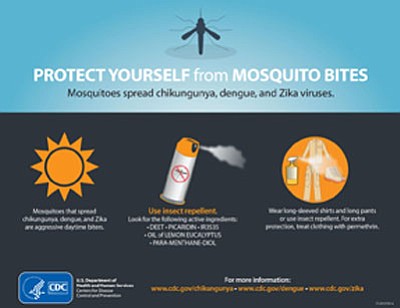BALTIMORE — As college students and families pack for winter break and holiday trips that might take them to popular destinations where the Zika virus is still being spread locally by mosquito and people, Health and Mental Hygiene is reminding Marylanders to exercise caution.
“We certainly want those taking trips to warmer destinations this winter to enjoy themselves,” said Health and Mental Hygiene Secretary Van T. Mitchell. “We want to remind residents that they should pack accordingly, especially if they are visiting areas where the spread of Zika – especially by mosquitoes – is still a threat.”
“While the threat of Zika transmission from mosquitoes has diminished here in Maryland because of colder weather, all of the confirmed Zika virus cases here so far have occurred as a result of travel abroad,” said Public Health Services Deputy Secretary Dr. Howard Haft. “We think that the new total will better reflect the impact of Zika virus on Maryland residents.”
According to the U.S. Centers for Disease Control and Prevention (CDC), many people infected with the Zika virus will not have any symptoms.
Zika virus is chiefly spread through mosquito bites— though less frequently, transmission via sexual contact, blood transfusion and to newborns during pregnancy has been documented.
Because of the link between Zika and birth defects including microcephaly— which is characterized by smaller heads and underdeveloped brains in newborns— the CDC recommends that pregnant women consider postponing travel to areas where Zika virus is spreading. These areas now include Cape Verde, Mexico and countries in Asia, the Caribbean, Central America, the Pacific Islands and South America.
Women who are pregnant or are trying to become pregnant are advised to not travel to countries with known local Zika transmission. Men who have traveled to an area with Zika and whose partner is pregnant should use condoms every time they have sex or they should abstain from sex during the pregnancy.
Sexual transmission guidance for both men and women has been released by the CDC. All men with Zika virus disease or possible Zika virus exposure who are considering attempting conception with their partner should wait at least six months. Women with Zika virus disease or possible Zika virus exposure should wait at least 8 weeks. Those who have traveled to an area with Zika who are not trying to conceive should use the most effective contraceptive method that can be used correctly and consistently, including condoms or dental dams, to prevent the spread of the virus.
When traveling to countries where Zika virus or other viruses spread by mosquitoes are found, travelers are advised to take the following steps:
•Wear long-sleeved shirts and long pants.
•Stay in places with air conditioning or that use window and door screens to keep mosquitoes outside.
•Sleep under a mosquito bed net if you are overseas or outside and are not able to protect yourself from mosquito bites.
•Use Environmental Protection Agency (EPA)-registered insect repellents. When used as directed, EPA-registered insect repellents are proven safe and effective, even for pregnant and breastfeeding women.
•Always follow the product label instructions.
•Reapply insect repellent as directed.
•Do not spray repellent on the skin under clothing.
•If you are also using sunscreen, apply sunscreen before applying insect repellent.
•If you have a baby or child: Do not use insect repellent on babies younger than 2 months of age; Dress your child in clothing that covers arms and legs or cover crib, stroller and baby carrier with mosquito netting; Do not apply insect repellent onto a child’s hands, eyes, mouth, and cut or irritated skin.
Adults: Spray insect repellent onto your hands and then apply to a child’s face ; Treat clothing and gear with permethrin or purchase permethrin-treated items; Treated clothing remains protective after multiple washings. See product information to learn how long the protection will last; If treating items yourself, follow the product instructions carefully; Do NOT use permethrin products directly on skin. They are intended to treat clothing.
For more CDC information on avoiding Zika infection during travel, visit http://goo.gl/lgHuWC.
